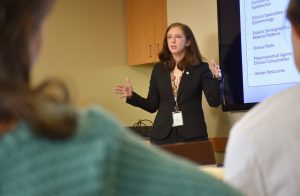Melissa Culp, MEd, RT(R)(MR), spoke to a crowd of more than 30 people about RAD-AID International, a nonprofit designed to increase and improve radiology in poor and developing regions, as part of the UNC School of Medicine Office of International Activities’ Global Forum.

Culp is an assistant professor with the Division of Radiologic Science in the Department of Allied Health Sciences. She also serves as chief operating officer with RAD-AID, a nonprofit founded in 2008. Beginning in 2012, the World Health Organization (WHO) recognized RAD-AID as a non-state actor in official relations with the United Nations and with the WHO.
Radiology is an essential tool for people facing various health care issues, including stroke, trauma, cancer, and women’s health, and is used in a variety of different settings.
Culp’s talk, titled “Radiology in Global Health,” discussed the UNC School of Medicine’s role in expanding radiology around the globe, thanks to partnerships with school’s Department of Radiology and the Division of Radiologic Science.
“Everyone should have access to what they need to live a healthy life,” Culp said. “We need to meet people where they are to achieve that vision for the future.” Culp said the WHO has determined more than half of the world’s population does not have access to radiology services. The lack of access to these technologies can lead to various outcomes, including health inequity and disparity in survival rates.
RAD-AID volunteers come from 114 countries and from 71 RAD-AID chapters at academic institutions in the United States and Canada. Availability of radiology, particularly in low and middle-income economies, can be scarce. To that end, RAD-AID volunteers work to establish partnerships that improve radiology access sustainably via human capacity development and economic growth.
“The volunteers at RAD-AID are the most important asset,” Culp said. “It’s nice to have this information exchange and support to be able to work together at sites.”
More than 30 people from various disciplines, including pulmonology, obstetrics and gynecology, emergency medicine, family medicine, pharmacy, and pediatrics, attended Culp’s talk; John Campbell, MD, and Malik Mossa-Basha, MD, joined Culp as co-presenters.
Campbell, a resident in the Department of Radiology, has visited Kamuzu Central Hospital (KCH) in Lilongwe, Malawi, and has played an integral role in curriculum development for ultrasound use at KCH. He plans to return later this year to continue to address radiology needs in a sustainable way. Campbell explained that Malawi has two radiologists for a population of 19 million people; there is a significant need to educate and train health professionals in Malawi on the appropriate use of imaging. Campbell is a committee member with the RAD-AID Interventional Radiology Program.
Mossa-Basha, a program manager for RAD-AID Middle East, is also a resident in the Department of Radiology and is working to provide sustainable health care and radiology services to Syrian refugees by training local medical providers in Jordan and other nations.
The OIA hosts a monthly global health forum that features UNC-Chapel Hill clinicians, researchers, resident physicians, and scholars in order to build a global health learning community.